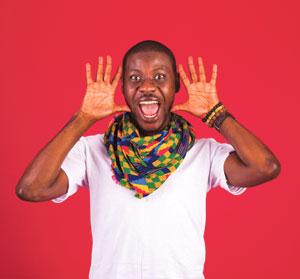From Grade 1 until he left Ghana at age 15, Tawiah M’carthy could depend on his classmates calling him names like Obaaberima, a slur in the Twi language meaning girlie-boy or girl-boy. Now he has turned the insult into a new play about coming out and discovering one’s identity in a new country.
Obaaberima, M’carthy’s one-man show opening at Buddies in Bad Times Theatre on Sept 15, is a coming-of-age story about a young man named Ageman, told through the voice of Sibongola, Ageman’s female self.
While Ageman lacks confidence and authenticity — he’s confused about his sexuality and his loyalties — Sibongola is beautiful and honest. As the play’s narrator, Sibongola articulates the messy things going on within Ageman that he alone doesn’t have the words to describe.
M’carthy is new to Canadian theatre; Obaaberima is his second piece, but his techniques are time-tested. He takes much of his dramatic inspiration from Ghanaian storytelling. Growing up in Accra, the cosmopolitan capital, he was exposed to drama at school. But as a child during vacations, he was sent to visit his mother’s family far away in rural Ghana. That is where he was exposed to Akan folktales told by his grandmother, aunts and cousins.
The electricity in the village would go out every night, M’carthy remembers, and “we would all sit in front of my grandmother’s house with kerosene lanterns lit and she’d tell us stories and we’d sing, and sometimes she’d teach us dances that tell stories or songs that have stories attached to them and we’d join in.”
This form of storytelling requires a close relationship between the teller and her audience, whose members need to be able to jump in and improvise scenes. The lessons from a story are emphasized through song and dance.
“The whole idea is to mix all the forms together,” M’carthy says. “As you tell the story you move into the story. As you tell it, you stop narrating and move into the present of the story and start presenting the story in the present.”
In Obaaberima, M’carthy worked with multi-instrumentalist Kobèna Aquaa-Harrison to develop an original score of West African percussion and guitar. Aquaa-Harrison performs live with M’carthy, colouring in the many moments of song and dance.
M’carthy won’t demand that his Buddies audience actively participate, but they do play a narrative role: the play opens in a Canadian jail cell, where Ageman, as Sibongola, tells the other prisoners the violent story of how he got there on the eve of his release. The audience will act as the prisoners.
After M’carthy graduated from York University’s acting conservatory he found it very difficult to find work as an actor with an African accent. “I got out of school with all these hopes that I was going to be a superstar, and no one was hiring me.”
It was during this period that M’carthy says he really had to face who he was both as an actor and as a gay man: “People couldn’t place me because I honestly didn’t know who I was at that time. I was out but not out to everyone.”
While in university he’d written a play called The Kente Cloth, and a friend encouraged him to finish it. After its success at SummerWorks he submitted a piece of poetry to Buddies in Bad Times’ Young Creators Unit about a boy trying on his mother’s red high heels. That was the beginning of Obaaberima. The boy trying on heels is now a scene in the play.
In some ways Ageman’s story echoes M’carthy’s own, though he insists the play is definitely not autobiographical; M’carthy has never been to jail, for example. The cold isolation Ageman feels when he comes to Canada as a foreign student is based on M’carthy’s teenaged experiences of moving from Accra to the small town of Merritt, British Columbia, where people, he says, were very polite but left him feeling like the odd one out.
From his time in BC, then to Scarborough, where he became acquainted with being on the “down low,” then to York University, M’carthy knows what it is to be both displaced and also in the closet. His reason for making the play is to reach “those people from other places who are lost or who find themselves in hiding here.
“When I came out and entered the community, I wasn’t meeting people where I am from. It felt like there was a black gay community that was segregated from the white gays and Latino gays,” he says. “It seemed that Buddies was for a white, gay audience, so it’s exciting for me to be a part of this. I feel like now the doors are open for everyone to come in. And it feels great to have a hand in the shift.”

 Why you can trust Xtra
Why you can trust Xtra


